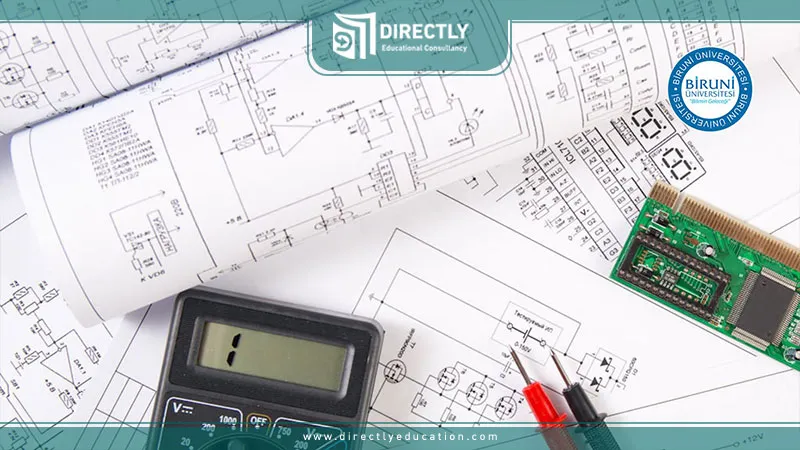Table of Contents
Toggle
Are you thinking about studying Electrical and Electronics Engineering? Biruni University in Turkey is your ideal choice to achieve this dream.
Electrical and Electronics Engineering at Biruni University is one of the most sought-after and advanced engineering fields in modern times.
In this comprehensive guide, we provide you with a complete overview of the Electrical and Electronics Engineering program at Biruni University, shedding light on everything you need to know; from an introduction to the program and academic accreditations, to the advantages and curriculum, and finally, the registration requirements and career prospects.
Don’t miss reading this article until the end to learn about this field and get free admission through Directly
Overview of the Electrical and Electronics Engineering Program at Biruni University
Biruni University in Turkey announced the launch of the Electrical and Electronics Engineering program in 2023, making it one of the most important new programs in the Faculty of Engineering.
Here’s an overview:
- Program Launch: The Electrical and Electronics Engineering program was launched in Turkish for the 2023-2024 academic year.
- University Level: Biruni University, a private institution, is ranked among the top universities in Turkey, thanks to its academic excellence and modern infrastructure.
- Student Diversity: The university hosts nearly 1,200 international students out of a total of 9,000, creating a multicultural educational environment.
- Study Costs: The tuition fees at Biruni University are moderate compared to European universities, making it an economically attractive option for students.
This new program offers an excellent opportunity for ambitious students in the field of Electrical and Electronics Engineering, with a focus on providing comprehensive education that meets both local and international market demands..

Accreditations and Recognitions of Biruni University in Turkey and Internationally
Biruni University has received numerous local and international accreditations and recognitions that enhance its academic reputation, making it a preferred destination for students from all over the world.
Some of the key accreditations and recognitions include:
- Recognition by the Higher Education Council of Turkey (YÖK): This recognition affirms the university’s commitment to the quality standards set by the Turkish government.
- EPDAD Accreditation: This accreditation from the Teacher Preparation Association reflects the quality of academic programs offered in the field of education.
- NAFSA Accreditation: This accreditation strengthens the university’s standing in international education and exchange, highlighting its commitment to providing a diverse and inclusive educational environment.
- EAIE Recognition: The European Association for International Education recognizes Biruni University, enhancing its collaboration with European educational institutions.
- European Union Recognition: This recognition opens doors for Biruni University students to participate in academic and research exchange programs with European universities.
- Arab Countries Recognition: The university has received recognition from several Arab countries such as Egypt, Yemen, Libya, and Lebanon, making it a trusted option for Arab students seeking higher education in Turkey.
The Accreditations and Recognitions of Biruni University demonstrate the high standards of education and training offered at the institution. These accreditations play a crucial role in preparing graduates who are fully equipped to excel in the global job market.
Advantages of Studying Electrical and Electronics Engineering at Biruni University
Studying Electrical and Electronics Engineering at Biruni University is an ideal choice for ambitious students looking for a bright future in this field.
Here are some advantages of studying this major at Biruni University:
- Strong Foundation: The university provides a solid foundation in mathematics, physics, and basic engineering principles to ensure a deep understanding of core concepts.
- Comprehensive Curriculum: The program covers advanced areas such as digital signal processing, control systems, electrical machines, and power systems, broadening students’ knowledge.
- Advanced Practical Skills: Students gain valuable hands-on experience through practical training in laboratories equipped with the latest technologies, as well as learning programming languages like C, MATLAB, and Python.
- Diverse Specializations: Students have the opportunity to specialize in specific areas that align with their interests and career goals.
- International Educational Environment: The program is offered in English, enhancing students’ opportunities in the global job market and enabling them to participate in international research and conferences.
- Industry Collaboration: The university works to strengthen ties with industry to ensure that the education provided is directly relevant to practical requirements and to offer professional training opportunities for students.
These advantages contribute to Biruni University’s reputation as one of the top universities in Turkey, ensuring that students receive high-quality education and a comprehensive learning experience that paves the way for a promising career in Electrical and Electronics Engineering, as well as other engineering fields.

Courses in Electrical and Electronics Engineering
The curriculum for Electrical and Electronics Engineering at Biruni University offers a comprehensive and balanced set of programmes aimed at equipping students with the essential knowledge and skills in this advanced field.
Here are the main courses included in the Electrical and Electronics Engineering programmes:
- Mathematics: Includes calculus, linear algebra, and differential equations to ensure a strong mathematical foundation.
- Physics: Covers the fundamental principles of physics that support the understanding of electrical and electronic phenomena.
- Electronic Circuit Design: Focuses on designing and building electronic circuits using various components.
- Digital Signal Processing: Explores the analysis and processing of signals using digital tools.
- Control Systems: Teaches the principles and methods used in the design of automatic control systems.
- Electrical Machines: Covers the operation and design of electric motors and generators.
- Power Systems: Deals with the generation and distribution of electric power, including smart grids and renewable energy sources.
- Communication Systems: Focuses on both wired and wireless communication technologies.
- Microelectronics Design: Students learn to design and build integrated circuits at the chip level.
- Programming and Simulation Languages: Students receive training in programming languages such as C, MATLAB, and Python to enhance their analytical and practical skills.
This variety ensures that students gain comprehensive knowledge and advanced skills, preparing them for active participation in the job market and enabling them to contribute to global technological advancement.
Admission Requirements for Electrical and Electronics Engineering at Biruni University
Biruni University has set a number of requirements for admission to the Electrical and Electronics Engineering programs:
- High School Diploma: Applicants must hold a recognized high school certificate.
- Language Proficiency: Students must provide proof of Turkish language proficiency, such as a TOMER certificate. If no language certificate is available, students may enrol in a preparatory year to study the language before starting the main program
- Tuition Fees: Students must be able to cover the tuition costs.
If you have any questions about the admission requirements or the application process, feel free to contact us here for a free consultation.
Required Documents for Enrollment in the Electrical and Electronics Engineering Programme
Students who wish to enroll must provide a set of necessary documents, which include:
- High school diploma
- Copy of passport
- Language proficiency certificate
- Personal photos
- Application form
- Proof of payment
- Recommendation letter
- Curriculum vitae (CV)
These requirements and documents help ensure that qualified students are properly and appropriately admitted to continue their studies in the Electrical and Electronics Engineering programme at Biruni University.
Read also : The location of Biruni University dormitory, its advantages, disadvantages, and costs

Career Prospects and Job Opportunities in Electrical and Electronics Engineering
The future and job opportunities in the field of Electrical and Electronics Engineering are characterized by diversity and growth, due to the importance of this discipline in supporting global technological advancements.
Graduates in this field are qualified for many exciting career paths across various sectors. Here’s a look at some of these areas:
- Electric Power Sector: Involves the design, development, and maintenance of systems for power generation, transmission, and distribution, including work in renewable energy projects such as solar and wind energy.
- Electronics Industry: Covers the design and development of electronic circuits, consumer electronics, medical devices, and microelectronics.
- Information and Communication Technology: Includes the development and maintenance of communication networks, broadcasting and receiving systems, and wireless communication technologies.
- Automation and Control: Focuses on designing automated control systems and robotics in industrial and manufacturing sectors, enhancing efficiency and productivity.
- Research and Development (R&D): Opportunities exist to work on research projects aimed at developing new technologies in electronics and energy, contributing to innovation and pushing the boundaries of technological knowledge.
- Government and Defense Sector: Involves the design and development of electronic and electrical systems for national and defense projects, such as radar and military communication systems.
- Academic Field: Graduates can pursue postgraduate studies and work as academics or researchers in universities and educational institutions.
Biruni University enhances its students’ skills and capabilities through advanced curricula and intensive practical training, ensuring they are well-prepared to face modern engineering challenges and contribute effectively to technological progress
Tuition Fees for Studying Electrical and Electronics Engineering at Biruni University
he cost of studying Electrical and Electronics Engineering at Biruni University is an attractive feature for many students seeking high-quality education in Turkey.
The annual tuition fee for this program, which is taught in Turkish, is approximately $2,475 USD.
Why Should You Apply to Biruni University Through Directly?
We offer you personalized academic and admission guidance from the very beginning until you step into your university classroom, with continuous support throughout your registration and study journey.
All you need is your high school diploma — just reach out to us!
Invest in your future — contact us now and get free admission to Biruni University!
Frequently Asked Questions
What is the future of Electrical Engineering?
Electrical Engineering has a promising future due to the increasing reliance on electrical systems in various industries. With the rise of smart technologies, renewable energy, and automation, demand for skilled electrical engineers continues to grow globally.
What are the career options for an Electrical Engineering graduate?
Graduates can work in a wide range of sectors, including power generation and distribution, electronics manufacturing, telecommunications, automation, robotics, renewable energy, and research and development. Opportunities also exist in academia and government institutions.
Is Biruni University accredited and recognized?
Yes, Biruni University is accredited by the Turkish Council of Higher Education (YÖK) and holds several international recognitions including EPDAD, NAFSA, EAIE, and European Union acknowledgment. It is also recognized by many Arab countries, making it a reputable option for international students.
What does an Electronics Engineer do?
An Electronics Engineer designs, develops, and tests electronic systems and components such as circuits, microprocessors, communication devices, and medical equipment. They often work in industries like consumer electronics, healthcare, automotive, and aerospace.
What is the difference between Electrical Engineering and Electronics Engineering?
Electrical Engineering primarily focuses on large-scale power generation, transmission, and distribution systems. Electronics Engineering, on the other hand, deals with smaller electronic components and systems like circuits, sensors, and communication devices. While closely related, each has a unique focus and application area




